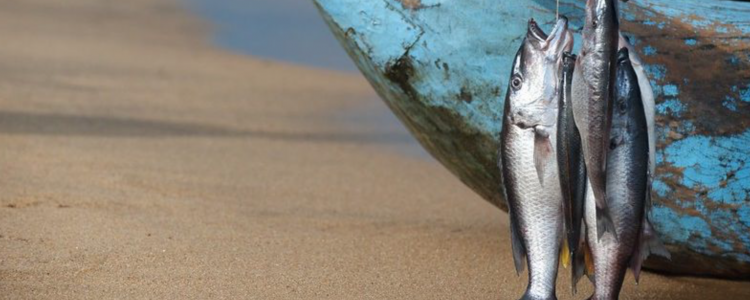Archive for year: 2020
Wednesday, 29 July 2020 - 16:30-18:00 Rome time
COVID-19 has exasperated efforts to improve food and nutrition security around the world, demonstrating our food systems are not prepared to withstand shocks. As research agendas pivot to COVID-19 response, recovery and resilience; our challenge is not to restore the old food systems but to transform them to do better for people and planet.
Aquatic foods must be part of this solution. They are highly regenerative and naturally rich in the micronutrients that humans need. Despite their importance, aquatic food systems are frequently overlooked in important policy and investment decisions due to the critical gaps in knowledge needed to address the complex challenges set out in the 2030 global sustainable development agenda, made now even more urgent by the impact of the COVID-19 pandemic.
This discussion forum, hosted by WorldFish and partners, seeks to build a concerted, science-based approach to ensure aquatic foods are an integral part of the response and recovery to COVID-19 and the transformation of global food systems towards healthier and sustainable diets.

28 July 2020, 2:00 to 3:30pm (Rome time)
Through an interactive discussion, this event will offer participants an opportunity to learn about the work of the gFSC and the initiatives under the CFS, especially the relevance of the Guidelines. Discussions will touch on ways to promote their use in shaping policies and coordinated action at country and regional levels.
Panelists will provide an overview of the work of the CFS and its role in the global governance of food security and nutrition, present the content of the Guidelines with particular attention to the policy recommendations included in Part 3, and present ideas on how UN agencies and bodies could promote their implementation.
More specifically, the webinar will:
- Familiarize participants with the CFS and showcase examples of its processes and products;
- Introduce participants to the current version of the Guidelines, its core messages and overarching goals;
- Stimulate a discussion on the potential role of the Guidelines in steering policymakers and relevant stakeholders when designing policies, laws, regulatory frameworks, strategies, and programmes at local, country, and regional levels;
- Reflect on potential areas of collaboration between the CFS and the gFSC, with particular attention to the potential use of CFS products – and more specifically the Guidelines – in support of the gFSC’s coordination activities, strategic programming and operations.
Thrusday 23rd July, 10:00-11:30 (EDT)
Recent developments – including the COVID-19 pandemic – have highlighted that our food and nutrition systems have not treated populations in developed or developing countries equally. Those suffering from the outcome of inequities - the poor, women and children, minorities, refugees and those living in fragile or conflict states - are disproportionately experiencing the negative consequences of hunger and undernourishment.
Today, the ultimate outcome of this disparity is glaring. Globally, 1 out of 9 people is hungry or undernourished while 1 out of 3 is overweight or obese. Many countries are experiencing the double burden of malnutrition, where undernutrition coexists with overweight, obesity and other diet-related non-communicable diseases (NCD’s).
Join FAO North America and the Alliance to End Hunger for a panel of global food and nutrition experts who will discuss the effects of inequitable food systems on nutrition and share sustainable solutions in both policy and practice.
Join the conversation on Twitter using the #NutritionEquity during the webinar.

Duty Station: Regional IFAD office in East and Southern Africa
Deadline for application: 18 March 2021
Latest Pics
 15th Africa Day for Food and Nutrition Security CommemorationNovember 4, 2024 - 11:08 am
15th Africa Day for Food and Nutrition Security CommemorationNovember 4, 2024 - 11:08 am Junior Parliament Engagement Meeting – Murewa DistrictNovember 4, 2024 - 11:05 am
Junior Parliament Engagement Meeting – Murewa DistrictNovember 4, 2024 - 11:05 am Nutrition Education SessionsOctober 11, 2024 - 9:13 am
Nutrition Education SessionsOctober 11, 2024 - 9:13 am ZAS 2024October 11, 2024 - 9:08 am
ZAS 2024October 11, 2024 - 9:08 am ZITF 2024October 11, 2024 - 9:04 am
ZITF 2024October 11, 2024 - 9:04 am
Follow us on Facebook
News Calendar
| M | T | W | T | F | S | S |
|---|---|---|---|---|---|---|
| 1 | 2 | 3 | 4 | 5 | ||
| 6 | 7 | 8 | 9 | 10 | 11 | 12 |
| 13 | 14 | 15 | 16 | 17 | 18 | 19 |
| 20 | 21 | 22 | 23 | 24 | 25 | 26 |
| 27 | 28 | 29 | 30 | 31 | ||
Contact Us!
Tel: +263 242 860 327
WhatsApp: +263 776 990 479
1574 Alpes Road
Harare
Zimbabwe
Email: info@fnc.org.zw
- Monday-Friday: 8am to 4:30pm
- Saturday: Closed
- Sunday: Closed

